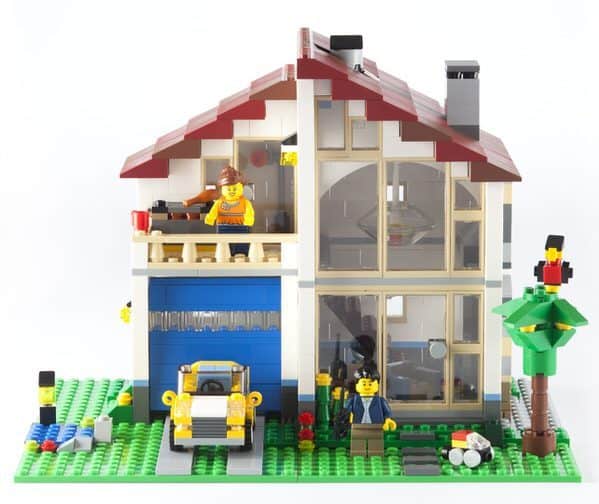For the first time on record, living with your parents is now the most common young adult living situation. According to the Pew Research Center, 32% of people ages 18–34 live in their parents’ home. Even when both parties try to make the best of things, tensions inevitably result. Parents may have adapted to having their home to themselves. The adult child who’s lived on his own at college may return to childhood bedrooms that still contain junior high memorabilia. Old notions about roles and expectations can show up at unexpected moments.
While it’s tough to avoid every potential conflict, following a few guiding principles can make it easier for families to reside under the same roof again, even when individuals have grown accustomed to having their own spaces. Here are six things to watch out for.

1. Acknowledge feelings, set expectations
Your feelings about your adult child moving back home may range from happy to worried to a variety of other emotions, possibly all at the same time. The young adult may also have conflicting feelings. Both of you can avoid a “failure to launch” situation by clarifying expectations from the outset. Tell your adult child you want to help her get established, but that you know she’d probably rather have her own place. And that you believe she’ll achieve that goal. Although humorists joke about the 35-year-old son who can’t leave Momma’s home cooking, this is not a typical situation — and certainly not one you want to encourage!
Explanations for why increasing numbers of young adults are moving back home include postponement of marriage and general economic pressures. There are positive aspects of living in the same house with your adult child, but not every moment will be positive — for you or for him. Remembering that the present living situation won’t last forever gives some breathing room for both parents and children, should tensions escalate.
One option: fixed term
Some people establish precise time limits that communicate the desire to assist their kids but also an intention to nudge the baby bird out of the nest when it’s time to fly. For example, parents let their children know that they have one year to live at home, but after one year is up, they have to move out. I have some friends whose children have each used their year and now are flourishing on their own. By the way, these adult kids are still on good terms with their parents and siblings. I’d call it a win-win arrangement.
Another option: milestones
If parents are worried their adult child lacks the motivation to support himself, they may want to establish some milestones indicating progress toward the young person’s eventual move-out. For example, they might ask their son to engage in a full-time job search. They might offer accommodation rent-free for a period of time, then charge rent. Or ask for a help purchasing food, doing chores, etc. While parents shouldn’t be heavy-handed, they can help their adult child best by encouraging him along a path toward long-term self-sufficiency.
2. Recognize your adult child is no longer a kid
It may sound obvious, but parents and children have to learn to relate to each other differently as they grow older. Especially when kids have been away at college, the family needs to establish new rhythms for daily life together. As tempting as it may be to monitor your daughter’s activities, toss her laundry in with yours, or straighten up her room, resist! You can help your relationship by treating her as the adult that she is now.
It’s a fine balance. You want to avoid constant inquiries about your young adult’s whereabouts, plans, and so forth. He’s not in high school anymore. At the same time, you need not (and should not) tolerate behaviors that might have been acceptable when he was younger. Like leaving dishes in the sink, towels on the floor, or other things you may have allowed in the past.
If it’s your eldest child who’s moving back home, beginning to treat her as an adult may prove difficult. But you’ll learn. When my youngest child moved back in to save money as he was starting his first job, he commented that his older siblings had already helped teach the parents (that’s my husband and me) to regard them as adults. So in some ways, he expected less friction during his time back at home. I think he was right.
In any case, respect your child as the adult she is now. She isn’t a grownup guest, but rather another individual sharing your home. You can encourage her to behave as an adult by ceasing to treat her as a child.

3. Communicate
Make sure you create the space to talk. For some families, it works to schedule conversations among all adults living under their roof. Others prefer a more casual exchange. Whatever your style, don’t put off talking about problems until they’ve gotten out of hand. Even if it feels awkward, set aside time early on to sit down for a cup of coffee, or a stronger beverage (everyone’s legal now, after all!). You can go over each other’s concerns and suggestions in a relaxed way. Doing so will help set a tone for dealing fairly with potential issues that may come up later.
A simple example might be the differing personal schedules of a daughter who works evenings, and a mom who leaves the house early in the morning. Both mom and daughter probably have suggestions for how the other one can be quieter, let the cat outside, etc. Talking about it will surface easy things the other person can do to respect the one who’s still asleep and contribute to household harmony.
Whether you schedule communication or simply talk as things come up, it may be good to aim for a monthly conversation. Just check in on how living arrangements are going, and discuss any potential issues. This is a great way to keep from avoiding small items for so long that they balloon into big problems.

4. Agree on house rules
If there is one thing people who’ve had problems with grown kids moving back home can agree on, it’s that they wish they’d put some ground rules or policies in place earlier. Even if your child has been living in your house for a while, however, it’s not too late.
House rules are closely related to the previous point about communication. While the people who own the home generally have more leverage when it comes to setting rules, they can avoid problems by discussing things with their adult child and being open to change.
For example, a parent may want to make a rule that the house has to be quiet from 10 pm to 7 am every day. But their adult child could point out that he sometimes wants to have friends over on the weekend. On such nights he would expect there to be noise in the house after 10 pm. By negotiating a concern like this in advance, parents and adult child can reach an agreement that hopefully will avoid uncomfortable situations and arguments down the road.
Other rules might involve little to no negotiation. For example, you may want to set expectations regarding laundry, keeping common areas clean, or how neat you want your child to keep his room/bathroom. You may ask your adult child to help with certain chores. You both could discuss plans for grocery shopping, cooking or cleaning out the refrigerator.
It’s best not to have too many rules, but rather to establish some guidelines where mutual respect informs people’s behavior. At the same time, a few rules can prevent annoying situations from repeating and growing into major conflicts. So draft a few rules, but be prepared for them to change and evolve as necessary.
5. Set and respect boundaries
All parties need personal boundaries. Boundaries in the sense that Henry Cloud and John Townsend discuss in their classic book, Boundaries*. In setting boundaries, parents and adult children accept ownership of their individual thoughts, feelings and behaviors. Each person sets limits on what he will do for the other, even though he may love the other unconditionally.
Numerous sources offer helpful guides on setting boundaries, both from the perspective of the parent as well as from that of the adult child. This is an important topic for parents and adult children to discuss — although I wouldn’t recommend talking about everything in a single sitting! The key is to open up lines of communication and be prepared to deal with potentially negative patterns that may have started years earlier.
Sometimes it helps to bring in a professional who can facilitate discussion among family members. A good therapist can assist a family to get to the root of a problem more quickly than they might be able to do on their own. While professional help can be instrumental in setting limits where addiction or abusive behavior exists, so-called “healthy” families can benefit as well.
Each of the prior success tips boils down to this issue of boundaries. Acknowledging your feelings and setting expectations describes your own boundaries. You also recognize and respect that your adult child has different boundaries from you. Both of you should talk with each other and agree on some house rules that make a few of your boundaries explicit. Thinking in terms of boundaries may clarify priorities for you and your adult child, resulting in positive outcomes for how you relate to each other.

6. Cherish the relationship
In the grand scheme of your life, your son or daughter moving home for a year or two is a short time. If you maintain good communication with your adult child and have a workable set of rules and guideposts for living together, this can be a rich chapter that will pay lifelong dividends. Try to plan regular dinners together, where you talk about interests each of you is pursuing and enjoy the other’s company in a relaxed setting.
Maybe you can talk with your child about your own goals and dreams, or relate elements of your family’s history that he was previously too young to understand. At the same time, ask him what he’s learning at his job, or what his opinions are on politics, current events or other topics. There may come a day when he moves far away, begins spending all his time with a significant other — or simply can’t engage in the easy interactions you might enjoy with him now, while you both are living in the same house.
I’m not advocating a relationship marked by co-dependency, where old patterns that explain and excuse certain behaviors continue and may even contribute to a child’s “failure to launch.” Rather, this is a time in both your lives when you can establish new adult behaviors that will benefit both of you for years to come.
Growth opportunities for all
A few guiding principles can help you turn a potentially difficult situation of your adult child moving back home into an opportunity for both of you to grow and relate to each other in new ways. Tips to remember:
- Acknowledge feelings, set expectations
- Recognize your adult child is no longer a kid
- Communicate
- Agree on house rules
- Set and respect boundaries
- Cherish the relationship
Following these guidelines will set a tone of mutual respect and cooperation between parent and child at a new phase of life for both of you. Take advantage of this time to build a friendship with a younger adult — one who just happens to share your own blood.
What are other suggestions or learnings you have for living under the same roof with your adult child?
Images via Shutterstock



